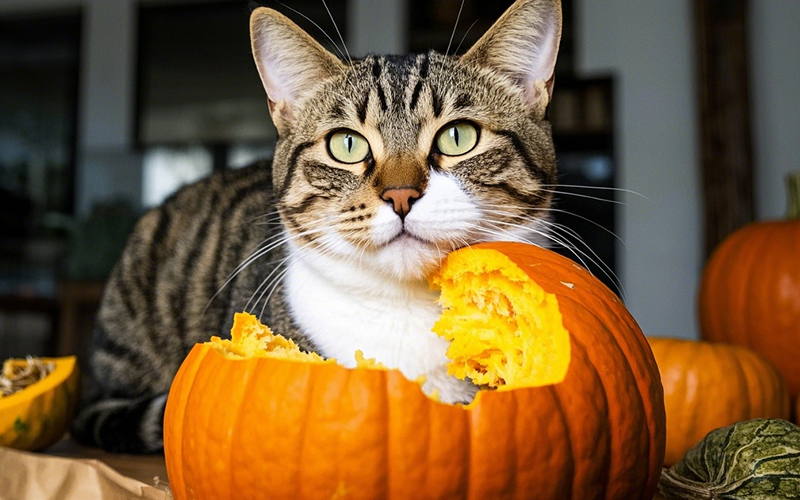Can Cats Eat Butternut Squash? A Healthy Treat for Your Feline
- 1 Apr 2025 16:39
If you're a cat parent, you may have wondered whether it's safe to share some of your butternut squash with your feline friend. 🍂 Butternut squash is a nutritious vegetable for humans, but can cats eat butternut squash safely? Let’s dive into the details of this vegetable and how it might impact your cat’s health.

What Is Butternut Squash?
Butternut squash is a type of winter squash with a sweet, nutty flavor and a rich orange color. It’s packed with vitamins, fiber, and antioxidants, making it a healthy addition to human diets. The question is, can cats benefit from this vegetable too? 🧐
Can Cats Eat Butternut Squash Safely?
The answer is yes, but with some precautions! 🐾 Butternut squash is not toxic to cats, and it can actually provide some benefits in moderation. However, because cats are obligate carnivores, their bodies don’t require plant-based foods, so it’s essential to serve it as a treat or supplement to their regular diet.
Butternut squash contains vitamins like A and C, which are beneficial to a cat’s overall health, especially for their immune system and skin. The fiber can also help with digestion, particularly if your cat is experiencing mild constipation.
The Benefits of Butternut Squash for Cats
Digestive Health: The fiber in butternut squash can help support healthy digestion. If your cat is prone to constipation, a small amount of this squash can help regulate their bowel movements.
Low in Calories: Butternut squash is a low-calorie food, making it a good treat for cats that need to manage their weight.
Rich in Vitamins: Vitamin A is important for eye health, and vitamin C boosts the immune system. These nutrients can be beneficial in small amounts for your cat’s health.
Hydration: Butternut squash has a high water content, which can help keep your cat hydrated, especially if they don’t drink enough water on their own.
How to Serve Butternut Squash to Cats
If you decide to give your cat some butternut squash, here are a few tips:
Cook It: Never give your cat raw butternut squash. Raw squash can be difficult to digest and may cause stomach upset. Always cook it thoroughly, either by roasting or boiling, and remove any skin or seeds, as they can pose a choking hazard.
Serve in Small Pieces: Cut the squash into small, bite-sized pieces. Cats are not used to large pieces of plant matter, so smaller pieces are easier for them to eat and digest.
Avoid Seasoning: Keep the squash plain. Do not add salt, butter, spices, or any other seasonings. These ingredients can be harmful to your cat.
Risks of Feeding Butternut Squash to Cats
While butternut squash is generally safe for cats in small amounts, there are a few risks to be aware of:
Gastrointestinal Upset: Too much butternut squash can cause stomach upset, diarrhea, or bloating, especially since cats' digestive systems aren't designed to handle large amounts of fiber.
Choking Hazard: As with any food, make sure the squash is cut into small, manageable pieces to avoid the risk of choking.
Not a Necessity: While butternut squash can be a healthy treat, it should never replace your cat’s main source of protein. Cats thrive on animal-based proteins, and plant foods should only be an occasional addition to their diet.
Alternatives to Butternut Squash for Cats
If you’re looking for other safe, healthy foods for your cat, consider these alternatives:
Cooked Chicken: A high-protein, digestible option that your cat will likely enjoy.
Carrots: Like squash, carrots are a low-calorie vegetable that can provide fiber and vitamins.
Pumpkin: A favorite for supporting digestion, pumpkin is high in fiber and can be easier for cats to digest than other vegetables.
The Role of PettureX in Pet Health
If you're ever unsure about whether a particular food is safe for your cat, PettureX can be a great resource! 🐾 PettureX is a friendly pet health assistant that provides 24-hour online consultation. With features like pet image recognition and expert guidance on what’s best for your cat, PettureX can help you make informed decisions about your pet’s nutrition and overall well-being. 🌟
Conclusion
So, can cats eat butternut squash? Yes, but only in moderation and with some care. Butternut squash can be a safe, nutritious treat for your cat when served in small, cooked portions. Just remember that cats are obligate carnivores and should primarily eat animal-based proteins. Butternut squash can be a healthy supplement, but it should never replace your cat’s regular diet.
For peace of mind about your cat’s diet, PettureX is an excellent tool to ensure your furry friend is always getting the best nutrition. 🐱💚
By following these guidelines, your cat can safely enjoy a little butternut squash as a tasty and healthy treat!
Related

Frankly Dangerous: Can Cats Eat Hot Dogs? Vet Explains the Serious Risks
- 16 Apr 2025
A Purrfect Protein? Can Cats Eat Ground Turkey Safely? (Vet-Reviewed Guide)
- 16 Apr 2025
Gritty Situation: Can Cats Eat Grits Safely? Vet Explains the Risks
- 16 Apr 2025
Crunchy Query: Can Cats Eat Green Peppers? A Vet-Reviewed Safety Analysis
- 16 Apr 2025
Gravy Danger Zone: Can Cats Eat Gravy Safely? (Vet-Reviewed Warning)
- 16 Apr 2025
Toxic Temptation: Can Cats Eat Grapefruit? Vet Explains the Dangers
- 16 Apr 2025
Emergency Meal or Major Mistake? Can Cats Eat Dog Food For A Couple Days? (Vet Guide)
- 16 Apr 2025
Dandelions & Felines: Can Cats Eat These Common Weeds Safely? Vet Explains
- 16 Apr 2025
Flaky Danger: Can Cats Eat Croissants Safely? Vet Explains the Buttery Risks
- 16 Apr 2025
Hazard Alert: Can Cats Eat Corn Husks? Vet Explains Dangers of This Fibrous Material
- 16 Apr 2025
